Proper nutrition for weight loss begins to interest us when we realize that diet does not help. Diet doesn't help - that's a fact. Why? The answer lies in the many prohibitions and restrictions on modern and well-known "proven over the years" diets. No matter how amazing, proper nutrition for weight loss should be varied, healthy and wholesome. There are several basic principles of such a diet. And there are also a lot of misconceptions, wrong decisions, stories about fantastic superfoods, blacklists of "harmful foods, " and stories about how to restore them wonderfully.

Before you start talking about nutrition, you need to understand that in recent years, more precisely, in the last 25-30 years, the balance of essential nutrients - proteins, fats and carbohydrates - has shifted significantly in relation to the carbohydrate component. At the same time, there is no need to stress and overestimate - go to any store and look out the window with sweets. They occupy almost a quarter of the store! And the first step in switching to a healthy diet to lose weight is to completely eliminate sugar from your daily diet. Sounds scary, right? Do you know why? Because sugar addiction is like drug addiction.
"Well, it's started. . . "More bans and restrictions! "
If you pay attention for a minute or two, you will agree that giving up sugar can be a great achievement in improving the health of the body and, consequently, weight loss.
Of course, we need carbohydrates. But which one? We’ve heard about fast and slow carbs. We need slow people. Containers made of cereals, flour, and vegetables. . . Fruits are quick to fill up on carbs, but it's better to eat them than to buy sweets from the pastry shop. Many nutritionists recommend resolute and drastic abstinence from carbohydrates and various forms, reducing their consumption to 20-50 g per day. Such a drastic transition to a normal diet can lead to dizziness, loss of energy, mood swings, and conviction that it is not healthy and that it is a healthy diet.
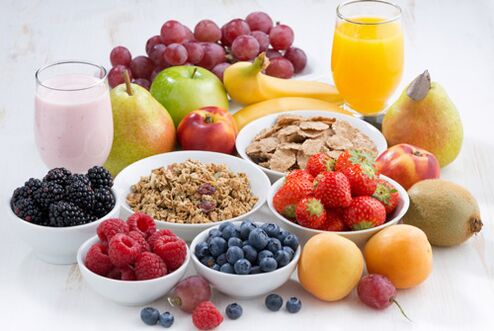
Proper nutrition for weight loss will bring you more benefits and joy if you go through it gradually, consistently and do not get lost. But first you need to understand why our bodies are so stubbornly resistant to any changes, especially the reduction in sugar levels.
Sugar is truly the scourge of our time. A few products offered to us in supermarkets are not even enough for a teaspoon of sugar. We don't even talk about sweets now! Juices, yogurts, marinades, sauces, semi-finished meat products, sausages and sausages, canned fish, instant soups, instant noodles. . . The list is almost endless! As dangerous as the transition to new diets is in the near future, we have almost nothing to eat! Fear not, there is a way out and it is much quieter.
Proper nutrition for weight loss begins with three steps.
The first step:Remove the sugar in its pure form. Tea, coffee, sugar-free compotes. We refuse canned food, jams, sweets, chocolates, cookies and other pleasures with our friends or on vacation at work. Ice cream, pastries and even low-calorie marshmallows are on our table! All carbonated beverages are prohibited. Try walking for two weeks without sugar, only two weeks - you will be amazed. The tea tasted different. Coffee too. Cocoa with added milk but no sugar charges better than any stimulant. And what to give with tea? At this stage, nuts (not salted), dried fruits, energy mixes with honey (a mixture of nuts and dried fruits, you can add lemon to it), butter and sandwiches (yes, yes! ), Cheese and ordinary sausage, and home-cooked porkGood with meat, with caviar, lightly salted salmon g. b. At the same time, tea with all these good things should not be added to breakfast, lunch or dinner and become a regular meal. But a little later on snacks.
The second step:When the body quickly switched to carbohydrates, it was time to eliminate foods with high glycemic levels: high-quality wheat flour, white rice and potatoes. In other words, all buns, breads, pies, peeled rice, cereals, as well as everyone's favorite semolina pies and all kinds of potatoes are automatically turned into delicacies from the daily diet. Yes, soups are no longer potatoes. At the same time, rye bread and bakery products (without sugar, remember? ), Buckwheat, steamed or simply poured overnight in clean water, quick-cooked oats, they are very rich in fermented dairy products, as well as all the exotic substanceswell mixed. or spelled, forgotten cereals like quinoa. In addition, clear sweet fruits - bananas, grapes, pears - should be excluded from the diet. Fruits are not included in this list due to their high acid content.
The third step:At this stage it is necessary to give up various carbohydrates, leaving only the natural carbohydrates that are part of vegetables and sour fruits. However, sometimes the first two steps are enough to significantly reduce weight. If you meet a few more conditions in parallel, you do not need to look for a new diet for yourself - proper nutrition comes first and you will move to a whole new level of life.
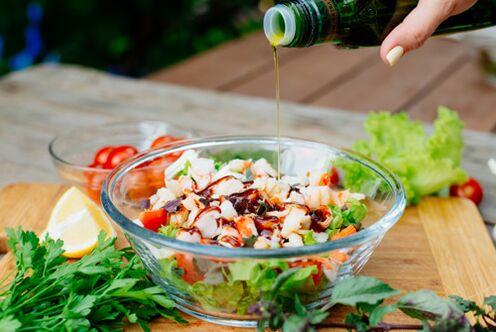
Proper nutrition for weight loss should be varied.Therefore, the balance should include not only certain BJUs (proteins, fats and carbohydrates), but also vitamins and micronutrients. If carbohydrates provide us with clean, accessible energy, it will be much more difficult for the body to obtain this energy from proteins and even fats. But in most cases, what is difficult to get is usually the most useful. Calories from carbohydrates are usually in excess, and our body makes almost no effort to process them, so the "sugar calories" are quickly absorbed into a comfortable fat roll.
Proteins are very important for our body.Protein is important throughout life: in childhood, it is a building material, an element that helps our body function and maintain itself as long as possible in adulthood. Judge for yourself: protein acts as a protector, in the production and transport of antibodies, the most famous protein hemoglobin provides oxygen to every cell, regulator - normal hormone production without protein, without motor - all types of movement myosin and actin proteins, plastic - collagen proteinappearance of the skin g. b. Proteins provide energy to the body - responsible for energy. However, one of the most important functions of a protein is to store and transmit gene information. The increasingly dangerous disease "Alzheimer's disease" is believed to be directly related to insufficient protein intake (not only that, but slightly below the second important component).
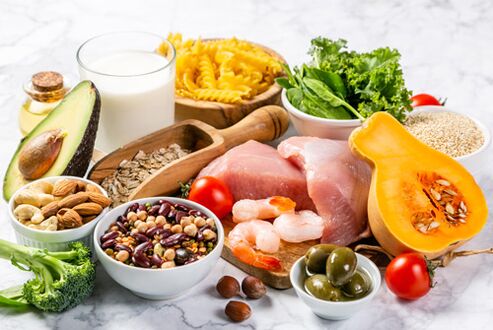
How Much Protein Does an Average Adult Need? Many nutritionists, doctors, and nutritionists adhere to the protein intake standard developed a hundred years ago by the German scientist Max Rubner, which is 0. 33 grams of protein per kilogram of body weight. Much has changed since then, and science has advanced, and recent studies have averaged 1, 2 - 2, 0 g per 1 kg of body weight. An impressive difference. Moreover, it is not the weight of 1, 2 - 2, 0 g of product, say, a piece of meat or a piece of bean, but the pure protein contained in the product. A sample sample of protein foods is posted on our website. Our site has written several times about the benefits of protein products, but repeating these general facts will never hurt.
Despite the popularity of vegetarian, raw foods and vegetarian diets, we need at least 50% animal protein to keep our bodies healthy. These include eggs, dairy products, fish and seafood, meat and intestines. Unlike plant foods, these proteins have a complete set of amino acids. Even if you have to eat them, variety is the essence of proper nutrition!
It is obvious that there is very little product on our planet. A combination of almost different foods, proteins, carbohydrates and fats. The last ingredient - fats here - was probably the biggest crime in the history of nutrition science. In a "perfect" case, fats were declared enemies of health. Everyone has heard of cholesterol, vascular plaques, and other dangerous events. When you look at how stores are jealously filling their range with low-fat or low-fat products, you begin to doubt that you sincerely want to provide us with "proper", "healthy", "living" food, because there is nothingProper and useful in the absence of fat in the diet.
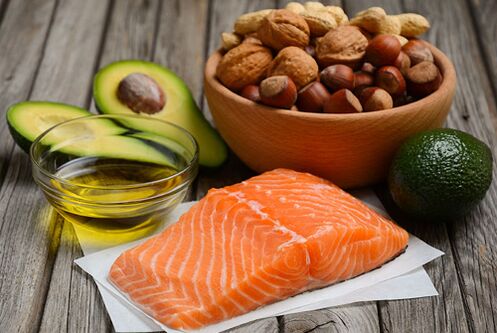
So what is the function of body fat? You say - help digest small soluble vitamins. Is it over? Someone from a biology class at schoolsomeone will remember the heat exchange function of fats. Therefore, the most important function of fats in the body is insufficient metabolism, in other words, the exchange of oxygen in the alveoli of the lungs. Oils scratch the walls of the alveoli with the thinnest layer and breathe. . . allows you to live. My grandmother's treatments for lung diseases immediately come to mind: borscht oil, dog oil, goose fat, hot milk and butter - there is fat everywhere, inside and out, and it helped! Incidentally, it is an oil emulsion, a drug that treats hypoxia (oxygen starvation) that is now being sold for wild money, which helps. Another important function of fats is the synthesis of membranes. The cell membrane is composed of 70-85% fat, and the function of the membrane is to provide protection for the cells, their thermal insulation and selective permeability (because not everyone who wants to enter the cell is useful or necessary for it). The myelin sheath, the insulating membrane of our nerves, is 70-80% saturated fat. Without myelin - Alzheimer's disease, old age (much younger), multiple sclerosis and mental illness. Fat is one of the most important substances for the membrane, myelin sheath, their functioning, as well as the functioning of the central and peripheral nervous system. Keep this in mind when choosing skim milk from 0, 5-3, 2%.
Another important function of fats is hormonal. Fats are the source of the synthesis of these hormones, and most of them are present in our bodies. These include growth hormones, protein hormones, thyroid hormones, digestive hormones, steroid hormones, adrenal hormones, sex hormones, and so on. b. It is clear that a slightly neutral, low production of various hormones can lead to major disruptions in the functioning of the whole organism. Sudden onset of dark spots and pimples, and various skin rashes are signs of low androgen levels. "Unexplained" frequent headaches can be a sign of low estrogen levels. Chronic insomnia is a lack of progesterone. Fatigue, tiredness, and even fatigue during rest can be a sign of a disruption in the production of thyroid hormones. Hair loss is also a sign of this disease. Weight gain can be caused by high levels of the hormones estrogen, cortisol and insulin, and low testosterone levels. Forgetfulness and distraction - low levels of estrogen and cortisol. How everything is connected!
Oils are responsible for regulating heat. Therefore, men who are not on a diet are hotter than women who are losing weight. Frequent freezing of the hands and feet, if this is not a congenital feature, may be a sign of a lack of fat. The most well-known function of fats is to help digest soluble vitamins: A, E, D, K. Sitting on a low-fat diet and taking vitamin complexes is not an option, and vitamins are not absorbed.
And finally, the most important - vitamins, minerals, macro- and micronutrients. These substances are found in different amounts and combinations in all products, but special attention should be paid to fresh vegetables, roots and fruits. One of the most valuable vitamins, vitamin C, is not synthesized in our body and we only get it from fresh plant foods. Our site has filled an entire section about vitamins, read on, helpful! Plant foods contain enzymes and flavonoids, as well as various minerals, without which we cannot function normally. For example, potassium disrupts the heart without it. Magnesium is responsible for the health of the brain, nervous and hormonal systems and is involved in metabolic processes. There is also fiber in plants - without it the processes of digestion and peristalsis are almost impossible!
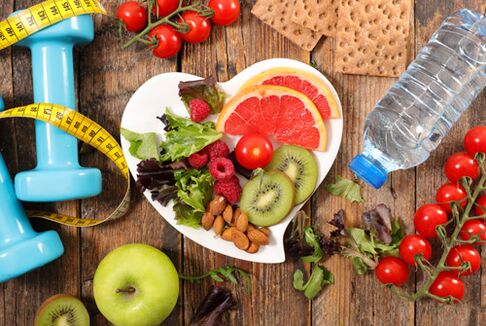
Proper nutrition for weight loss and improvement includes the following principles:
Eat no more than three meals a day. Unexpected, right? But what about the 5-6 meals a day advertised in many offers? Such fractional meals are ideal for children, athletes and seriously ill citizens. If you are not in one of these categories, eat three or even two meals a day.
Eat only when you are hungry, not at night. Breakfast is optional! If you do not want to eat breakfast, change breakfast in two hours. Don't pack light just because someone says breakfast is the most important thing.
Learn to listen to yourself and understand the difference between mixing something with hunger and a habit. The following suggestion will help.
Drinking water. Sometimes not in liters, as advised. Not boiled. Ideally bottled or bottled. It is easy to embarrass the drinking regime: 2 glasses warm in the morning (not cold and not boiling water), 1-2 glasses during the day and 1 glass in the evening. Sometimes it is enough to drink water to understand that you are not hungry, but just thirsty.
Get in the habit of buying different nuts and seeds often. In addition to fats, they contain large amounts of macro and micronutrients.
Eat whole foods. In other words, fat-free! Cottage cheese - not less than 9% fat, but with sour cream, coffee with sour cream, butter sandwiches, greasy cheeses, greasy seafood, exotic avocados, bacon! This is not a typical fire-to-fire distortion. Of course, everything needs to be taken care of.
Don't forget about proteins! But it is important to combine it. And this offer will be the last.
Eat vegetables. Lots of vegetables and fruits. Fresh, salted, pickled, steamed, boiled and even fried in oil! But of course, fresh salads are preferable. It is not difficult to calculate the amount of vegetables: divide your plate into two parts - half of which is occupied by vegetables, the other corresponds to proteins, fats and the same minimum allowable carbohydrates.
Proper nutrition for weight loss is not hard tables and recipes. This is a specially designed method. All of these tips only work when you are almost completely free of carbohydrates. If you combine proteins with carbohydrates (mashed potatoes) or fats with carbohydrates (bread and bacon) in a bowl, you're done. No, of course not. You just keep living, torturing every new pound and complaining about the injustice ("I’m just sitting on a piece of water, where does the fat come from??? "). There is no need to sit in the water, there is no need to suffer from hunger and diet. Start with three steps and walk without focusing on health and beauty.














































































